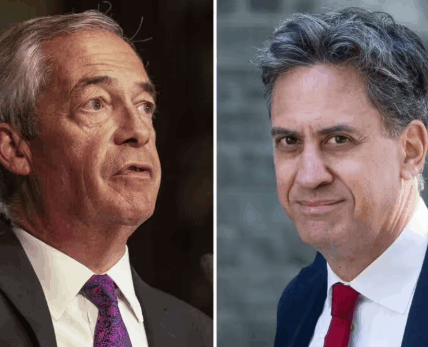Chancellor set to extend freeze on income tax thresholds, raise more money from IHT and put up fuel duty

Rachel Reeves is to launch a manifesto-breaking tax raid on incomes in this month’s Budget.
The Chancellor is set to extend the freeze on income tax thresholds as part of a triple raid that will include raising more money from inheritance tax and putting up fuel duty by as much as 7p. The freezing of the thresholds was supposed to end in 2028, but she is planning to extend it beyond that date.
An extension until 2030 would drag an extra 400,000 people into the basic rate of tax and 600,000 into the higher and additional rates, according to the Institute for Fiscal Studies. It would also mean the full state pension would be charged income tax for the first time.
The move would raise £7 billion a year – equivalent to an increase in the basic rate of income tax by 1p. However, the Labour manifesto said the party would “not increase taxes on working people”, including not raising National Insurance, the basic, higher or additional rates of income tax, or VAT.
Last year, Ms Reeves also appeared to admit that freezing income tax thresholds did amount to a tax on working people, saying: “People on average earnings are paying more in tax because they are dragged into higher tax brackets. That is a sign of failure. The government is picking the pockets of working people.”
On Friday night, Robert Jenrick, the Tory leadership candidate, accused Ms Reeves of breaking her manifesto promises, saying: “Another day, another broken manifesto commitment.
“Not content with taxing jobs, Labour now wants to hike taxes on working people’s incomes too. You can’t trust a word Keir Starmer says.”
Sir Keir, speaking in Berlin, refused to rule out any of the increases but said nothing in the announcement would break any manifesto commitments. “In relation to our manifesto, we are going to keep our manifesto pledges,” he said. “I’ve made that very clear.”
Ms Reeves is already facing a backlash from Labour MPs over the plan to raid income tax. One backbencher said: “It’s just really bad, isn’t it?
“There’s just no money and lots and lots of things that need money. I don’t really know what the alternative is, I suppose – but it’s going to be tough.”
Richard Burgon, who is serving a six-month suspension from Labour after rebelling over the two-child benefit cap, called on Ms Reeves to target the wealthy instead of “ordinary workers”.
The Chancellor’s plans emerged as new figures showed that households’ living standards were improving at the slowest rate in more than 50 years as soaring immigration fuels population growth and the economy stalls.
Figures from the Office for National Statistics (ONS) showed that real GDP per head, often described as a measure of average living standards, has grown at the slowest rate in decades since 2020.
It has increased by only 0.3 per cent a year on average so far in the 2020s, much lower than in any previous decade since at least the 1970s.
Ms Reeves will also use the Budget to raise the amount of money brought in from inheritance tax. One option being considered is to extend the seven-year rule on gift-giving to 10 years, according to the Financial Times.
Currently, assets given away during an individual’s lifetime are exempt from inheritance tax if the person lives for at least seven years after making the gift.
Extending the rule to 10 years would make it harder for wealthy people to pass on assets without paying inheritance tax, as they would need to live longer to do so.
Another idea said to be being considered by Ms Reeves is axing an inheritance tax exemption for some types of shares, while a further proposal is bringing defined contribution scheme pension pots within the orbit of the tax instead of exempting them on death.
The Chancellor is also thought to be planning a National Insurance raid as one of several tax rises in the Budget to raise £40 billion – more than the £22 billion black hole Labour has said was left by the Tory government.
On Thursday, The Telegraph revealed that Ms Reeves was considering putting up fuel duty for the first time in 13 years.
It has been frozen since 2011, and in 2022, in response to Russia’s invasion of Ukraine, was cut by 5p. The Chancellor is set to reverse that cut and bring back the old inflation link, adding another 1 or 2p.
On Friday night, the AA said it was concerned that other taxes – such as vehicle excise duty and company car taxes – could also be targeted.
Edmund King, the AA president, said: “Increasing fuel duty would hit everyone, not just drivers. Everything from the price of food in supermarkets to the delivery of social care within our communities is impacted by pump prices, and an unnecessary hike in fuel duty could make things worse.”
People start paying income tax at 20 per cent when their income reaches £12,570 and the higher 40 per cent rate at £50,270.
The Office for Budget Responsibility has said the basic rate threshold would have reached £16,310 by 2028/29 had it climbed in line with prices, with the higher rate only starting at £65,510.
The extension of the freeze would also mean the state pension will come under the orbit of income tax for the first time. The full state pension, currently £221.20 per week – or £11,502.40 a year – is set to rise to £11,974 next year and £12,906 by 2028/29.
If the personal allowance remains frozen at £12,570, it means roughly 1.4 million people who currently receive the full flat rate will start to see it taxed before the end of the decade. A further 500,000 who currently receive just below the full flat rate also risk their state pensions being dragged into the tax net.
A fifth of pensioners, around 2.5 million people, already have state pensions above the income tax threshold because they paid into a top-up scheme during their working life, according to the consultancy LCP.
HMRC data also show that 8.5 million people of state pension age pay tax on their income, including salaries and pensions.
Tom Wernham, a research economist at the Institute for Fiscal Studies, said: “Extending the freeze to thresholds by another two years would bring 400,000 more into tax, and 600,000 into higher and additional rates of tax.
“Whilst avoiding a headline-grabbing tax rate increase, freezing tax thresholds is a less transparent and more uncertain way for the Government to raise revenue. If inflation is higher or lower than expected, the revenues raised will also differ from expectations.
“And rather than raising revenues today, an extension of the freeze will improve the forecasts for the public finances while postponing the pain to the taxpayer until after 2027/28.”
On inheritance tax, Ms Reeves is also considering scrapping an exemption on paying the tax if the land being passed on is agricultural.
The agricultural property relief (APR) is designed to help farmers, but many feel it is being used by the mega-rich who buy up agricultural land to lower the amount of tax they will have to pay.
Tom Bradshaw, the president of the National Farmers Union, said: “Major APR changes would put at risk many farming families’ succession plans and consequently undermine the Government’s own ambitions for food and environmental security.”


